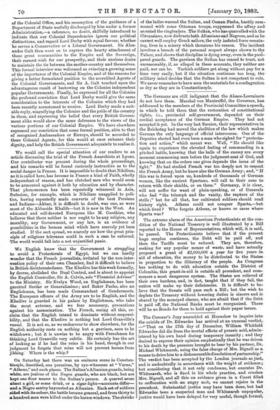On Saturday last there was an ominous scene in Constan-
tinople, described, one perceives, by eye-witnesses at " Varna," "Athens," and such places. The Sultan's Albanian guards, being white, are jealous of the Negro guards, who are black, but are kept one floor nearer to the Sultan's person. A quarrel arose about a girl, or some drink, or a cigar-light—accounts,differ- and a Negro sentry bayoneted an Albanian. Each set of soldiers sided with its colour, the battle became general, and from thirty to a hundred men were killed under the harem windows. The shrieks of the ladies warned the Sultan, and Osman Pasha, hastily sum- moned with some Ottoman troops, suppressed the affray ancl arrested the ringleaders. The Sultan, who has quarrelled with the- Circassians, now distrusts both Albanians and Negroes, and as he- cannot well employ Greek sailors, the only isolated force remain- ing, lives in a misery which threatens his reason. The incident involves a breach of the personal respect always shown to the Palace, and shows that discipline is dying away, even in the pani-- pored guards. The garrison the Sultan has ceased to trust, not unreasonably, if, as alleged in these accounts, they neither are- paid, nor can be. Turkish soldiers get along without pay for a time very easily, but if the situation continues too long, the- military mind decides that the Sultan is not competent to rule. We never remember to have seen the materials for a conflagration, so dry as they are in Constantinople.


































 Previous page
Previous page